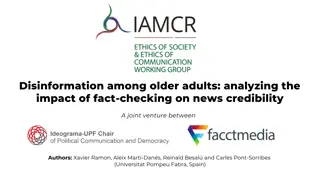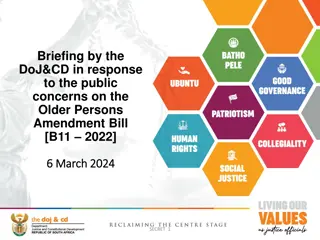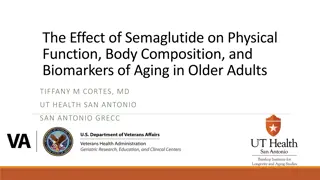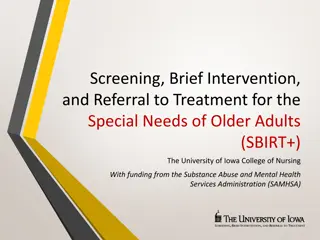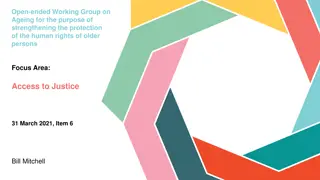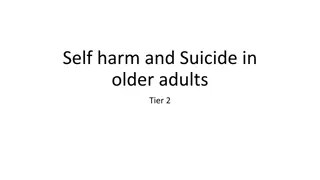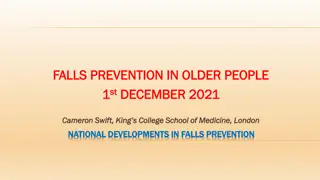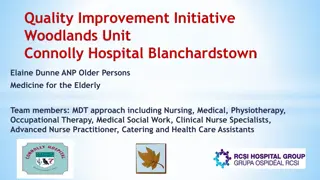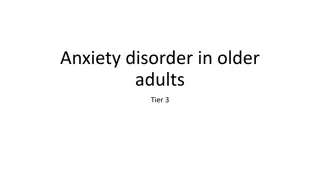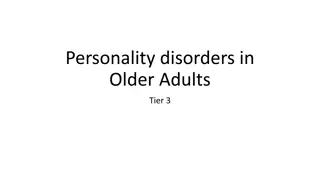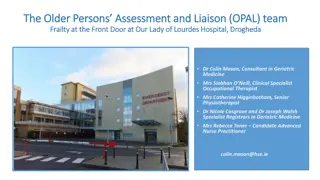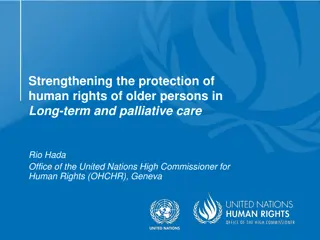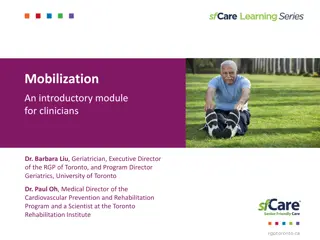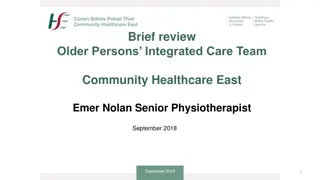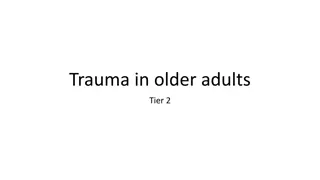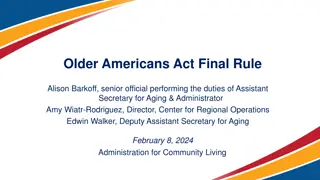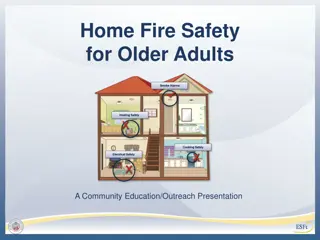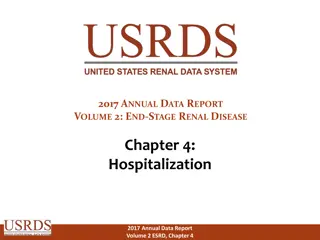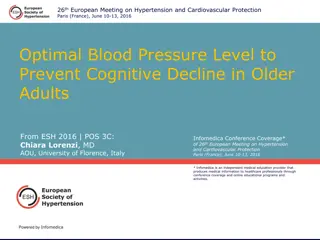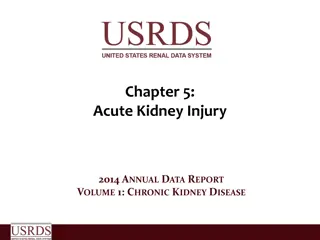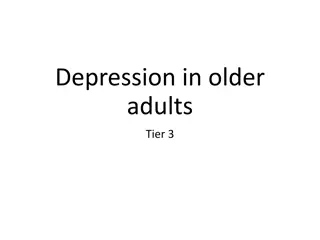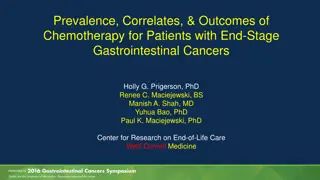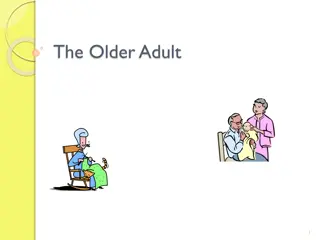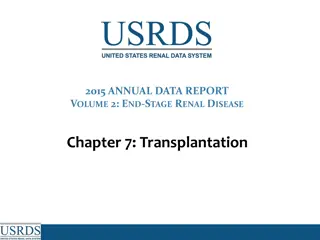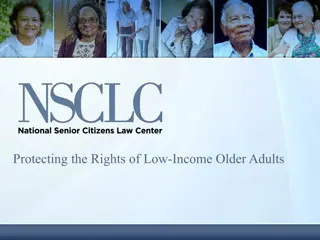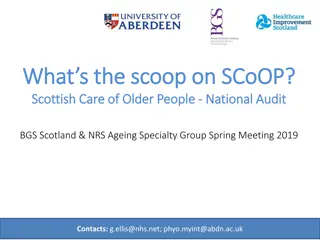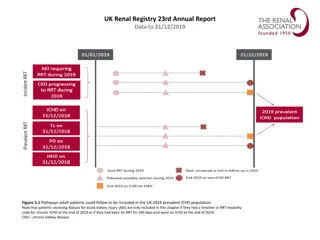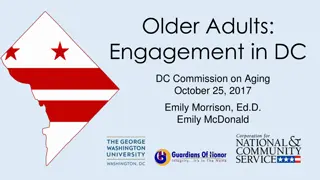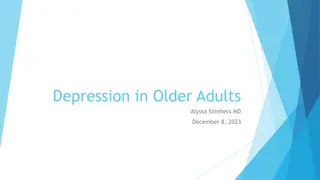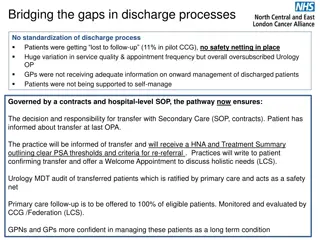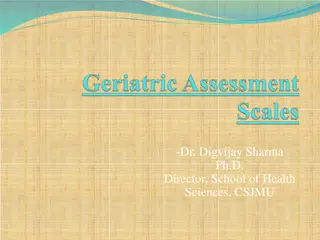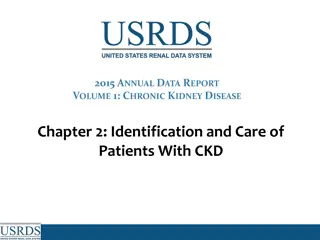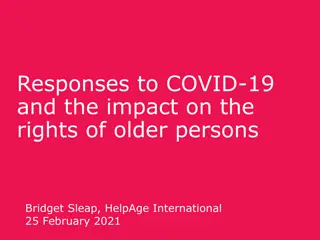Impact of Fact-Checking on Credibility Among Older Adults
Analyzing the impact of fact-checking on news credibility among older adults reveals that age is a key factor in information credibility. Older adults tend to give more credibility to various kinds of information, leading to potential challenges in discerning between true facts and false news. Fact-
5 views • 31 slides
Analysis of the Older Persons Amendment Bill 2022 Presentation
The presentation to the Portfolio Committee on the Older Persons Amendment Bill 2022 by Prof. Kitty Malherbe from the University of the Western Cape highlights commendable aspects of the Bill, concerns about clarity on the 'Caregiver' concept, and gaps in the text of the Bill. The analysis covers is
1 views • 11 slides
Kidney Replacement Therapy Incidence Trends in Malaysia
The data presented in this study outlines the stock and flow of new Kidney Replacement Therapy (KRT) patients in Malaysia from 2012 to 2022. It covers the incidence rates of new dialysis patients, hemodialysis (HD) patients, peritoneal dialysis (PD) patients, and transplant patients. The figures and
1 views • 12 slides
Addressing Concerns on Older Persons Protection: Response to Public Feedback
The Department of Justice and Constitutional Development responds to public concerns on the Older Persons Amendment Bill. The presentation focuses on key issues such as property rights, coercion, legal fees, and accessibility for older persons. Legal frameworks, including clauses in the bill and rel
0 views • 17 slides
Effect of Semaglutide on Aging Biomarkers in Older Adults
Semaglutide, a GLP-1 receptor agonist, shows promising effects on physical function, body composition, and aging biomarkers in older adults with diabetes. Studies suggest potential neuroprotective effects, improvement in skeletal muscle atrophy, and reduction in pro-inflammatory markers. Diabetes pr
0 views • 23 slides
Kidney Replacement Therapy Trends in Malaysia 2012-2022
A comprehensive overview of kidney replacement therapy (KRT) trends in Malaysia from 2012 to 2022 is presented, detailing the stock and flow of new KRT incidences and ESKD patients on KRT. The data includes the number of new dialysis patients, new HD patients, new PD patients, and new transplant pat
0 views • 12 slides
SBIRT+: Tailoring Substance Use Intervention for Older Adults
SBIRT+ is a targeted training approach focusing on Screening, Brief Intervention, and Referral to Treatment to meet the unique needs of older adults, addressing risky substance use in the elderly population. It aims to address the growing concern of alcohol use and medication misuse in Baby Boomers
0 views • 38 slides
Addressing the Justice Gap for Older Persons in Access to Justice
Older persons face a significant justice gap, with millions unable to access civil, administrative, or criminal justice. The absence of dedicated international norms, ageism, and limited UN frameworks contribute to this issue. Barriers include lack of specialist services, digital exclusion, and inad
0 views • 16 slides
Understanding Self-Harm and Suicide in Older Adults
Self-harm and suicide in older adults are serious issues that require attention due to the associated risks. The incidence of self-harm in adults aged 65 years and older is notable, with factors such as physical health conditions, pain, and psychiatric history contributing to the risk. Staff should
0 views • 23 slides
Falls Prevention in Older People: Key Concepts and Strategies
Falls prevention in older people is crucial due to the high prevalence of falls in this age group, leading to injuries, disabilities, and increased healthcare costs. Key concepts include recognizing falls as a significant threat in later life and identifying intrinsic and extrinsic factors contribut
0 views • 33 slides
Enhancing Care for Older Patients: A Multidisciplinary Approach at Woodlands Unit
Woodlands Unit implemented a multifactorial approach to reduce falls and enhance care for older patients. The initiative included safety huddles, education sessions, environmental changes, and improved communication with families. Positive outcomes were seen, including a reduction in falls, improved
0 views • 4 slides
Understanding Anxiety Disorders in Older Adults
Anxiety disorders in older adults are prevalent but often unrecognized. These disorders can manifest alongside depression, impacting daily life. Risk factors include gender, education, health status, traumatic events, and more. Types of anxiety disorders include generalized anxiety, phobias, panic d
0 views • 17 slides
Understanding Personality Disorders in Older Adults
Personality disorders in older adults can present challenges in social functioning and relationships. Diagnosis involves assessing difficulties in maintaining relationships, controlling behavior, and listening to others. Recent personality changes may not always be due to a personality disorder but
0 views • 14 slides
OPAL Team Improving Care for Frail Older Patients at Our Lady of Lourdes Hospital
Older Persons Assessment and Liaison (OPAL) team at Our Lady of Lourdes Hospital focuses on providing comprehensive geriatric assessment for frail older patients in the Emergency Department to improve outcomes and reduce avoidable admissions. The team's introduction led to positive results in patien
0 views • 4 slides
Understanding Personality Disorders in Older Adults
Personality disorders in older adults can present challenges in living with themselves and others, affecting social functioning and relationships. Prevalence estimates suggest around 10% in older community populations, with males more commonly affected. Different types of personality disorders exist
1 views • 12 slides
Advancing Human Rights of Older Persons in Long-term Care
Strengthening the protection of human rights and promoting equality for older persons in long-term and palliative care is essential in today's society. The demographic shift towards an aging population underscores the importance of respecting older individuals as rights-holders and active agents in
0 views • 12 slides
Mobilization: Importance, Risks, and Recommendations for Older Adults
Encouraging mobilization in older adults is crucial to counteract muscle loss and avoid negative health consequences associated with immobility. This module highlights the impacts of immobility, provides recommendations for mobilization based on frailty status, and offers ideas for promoting mobilit
0 views • 24 slides
Molecularly-Guided Therapy vs Platinum Chemotherapy in CUP Patients
This trial aims to compare the efficacy and safety of molecularly-guided therapy or cancer immunotherapy based on genomic profiling with platinum-based chemotherapy in patients with cancer of unknown primary site. The study design includes multiple treatment regimens guided by genomic profiles, with
4 views • 9 slides
Integrated Care Programme for Older Persons in Community Healthcare
The Integrated Care Programme for Older Persons (ICPOP) aims to provide integrated services for older individuals with complex health and social care needs, focusing on community-based care for improved quality of life. The programme includes pioneer sites across the country, such as CHO6 Community
0 views • 13 slides
Understanding Trauma in Older Adults: A Comprehensive Overview
Trauma in older adults is often under-recognized and under-treated. It can have lasting adverse effects on their well-being. Recognizing the signs, responding appropriately, and avoiding re-traumatization are crucial steps in supporting older adults who have experienced trauma. Triggers such as anni
4 views • 12 slides
Understanding the Older Americans Act and Its Impact on Aging Services
The Older Americans Act (OAA) plays a vital role in providing programs and services to support older adults in aging-in-place. This act authorizes various initiatives such as meal assistance, caregiver support, health services, and more to enhance the well-being and independence of older individuals
1 views • 34 slides
Home Fire Safety for Older Adults - Community Education Presentation
The importance of fire safety for older adults is emphasized in this community education presentation. Statistics reveal the significant risks older adults face from home fires and the leading causes behind such incidents. Strategies to reduce these risks through prevention and preparation are discu
0 views • 13 slides
Enhancing Housing Options for Older People in Manchester
The Housing Options for Older People (HOOP) initiative, in partnership with First Stop, aims to address the housing needs of older individuals in Manchester. By providing dedicated resources, support, and services, the program helps older adults maintain independence, improve health outcomes, and re
0 views • 19 slides
Hospitalization Trends for End-Stage Renal Disease Patients 2006-2015
Analysis of adjusted hospitalization rates for End-Stage Renal Disease (ESRD) patients by treatment modality from 2006 to 2015, indicating differences in rates based on age, sex, race, and primary cause of kidney failure. The data covers all-cause and cause-specific hospitalization rates for ESRD pa
0 views • 21 slides
Understanding B-Cell Prolymphocytic Leukaemia and CLL-Related Conditions
B-cell prolymphocytic leukaemia (B-PLL) is a rare disorder that mainly affects older patients, presenting with splenomegaly and high white blood cell counts. CLL-related conditions like Monoclonal B-cell lymphocytosis and Richter's syndrome can further complicate the prognosis, especially in elderly
0 views • 23 slides
Optimal Blood Pressure Levels to Prevent Cognitive Decline in Older Adults
Observational study at the 26th European Meeting on Hypertension suggests maintaining high-normal levels of systolic blood pressure between 130-145 mmHg may reduce cognitive decline and mortality risk in older adults. The complex relation between blood pressure and cognitive impairment is explored,
0 views • 9 slides
Trends in Acute Kidney Injury Among Medicare Patients Aged 66 and Older
This report analyzes data from the 2014 Annual Data Report Volume 1 on Chronic Kidney Disease, focusing on acute kidney injury (AKI) among Medicare patients aged 66 and older from 2003 to 2012. It examines the percentage of patients with AKI hospitalizations and those requiring dialysis, along with
0 views • 20 slides
Understanding Depression in Older Adults
Depression in older adults is not a normal part of aging and should not be ignored. It is characterized by a group of signs and symptoms, including depressed mood, disturbed sleep, lack of enjoyment, reduced energy levels, and thoughts of self-harm. Older adults may present with different symptoms s
0 views • 22 slides
Chemotherapy Utilization in End-Stage Gastrointestinal Cancer Patients
This presentation explores the prevalence, correlates, and outcomes of chemotherapy use in patients with end-stage gastrointestinal cancers. Data is presented on the frequency of chemotherapy administration, correlates, harms, and benefits in patients in their final months of life. Insights from stu
0 views • 21 slides
Understanding and Respecting Older Adults: Challenges and Strategies
Exploring the misconceptions and challenges faced by older adults, this content highlights the importance of combating ageism in healthcare. It emphasizes the need for nurses to overcome stereotypes, involve older adults in decision-making, and address their unique needs with respect and understandi
0 views • 21 slides
Analysis of Kidney Transplant Trends in End-Stage Renal Disease Patients (1996-2013)
This report delves into the trends surrounding kidney transplants in end-stage renal disease (ESRD) patients from 1996 to 2013. It looks at the percentage of dialysis patients wait-listed, unadjusted kidney transplant rates, number of patients wait-listed for kidney transplants, transplant counts, p
0 views • 33 slides
Advocating for the Rights of Low-Income Older Adults and LGBT Long-Term Care Consumers
The National Senior Citizens Law Center works tirelessly to protect the rights of low-income older adults through advocacy, litigation, and education. They advocate for LGBT long-term care consumers to ensure their health, economic security, and access to justice. A survey highlighted concerns faced
0 views • 18 slides
Scottish Care of Older People (SCoOP) Audit Program at University of Aberdeen
The Scottish Care of Older People (SCoOP) audit program at University of Aberdeen aims to assess specialist service provision for older individuals with frailty in Scotland. By providing benchmarking data, the program helps improve services' quality, safety, and access while highlighting variations
0 views • 31 slides
UK Renal Registry 23rd Annual Report 2019 Data Analysis
The UK Renal Registry's 23rd Annual Report provides comprehensive data on the pathways followed by adult patients to be included in the UK 2019 prevalent ICHD population. The report includes figures on percentage of patients with URR >65%, median URR achieved, changes in URR by sex between 2009 and
0 views • 19 slides
Civic Engagement and Volunteering Among Older Adults in Washington, D.C.
Understanding the impact of civic engagement and volunteering on older adults in Washington, D.C. This study explores how older adults engage in community activities, the benefits they experience, and the reasons for emphasizing their involvement. Research highlights the importance of political part
0 views • 29 slides
Understanding Depression in Older Adults: Symptoms, Risk Factors, and Treatment Options
Depressive symptoms in older adults are common but often go unrecognized. While depression is not a normal part of aging, older adults may exhibit a variety of depressive symptoms. Risk factors include pain, isolation, insomnia, medical comorbidities, and more. Classification includes Major Depressi
0 views • 38 slides
Improving Discharge Processes for Urology Patients
Addressing gaps in discharge processes for urology patients led to the implementation of a standardized pathway ensuring proper communication, transfer protocols, and follow-up strategies. The pathway includes informed patient transfers, detailed communication with primary care, holistic needs asses
0 views • 5 slides
Comprehensive Geriatric Assessment: Enhancing Care for Older Adults
The field of geriatrics focuses on the unique healthcare needs of older adults. Geriatric assessment involves a multidimensional approach to evaluate medical, psychological, social, and functional aspects of elderly individuals. By utilizing specific tools to assess various dimensions, including cog
0 views • 49 slides
Chronic Kidney Disease: Prevalence and Comorbid Conditions Among Medicare Patients
The data report presents information on the identification, care, and prevalence of Chronic Kidney Disease (CKD) among Medicare patients aged 65 and above in 2013. It includes tables showing the ICD-9-CM codes for CKD stages, prevalence of coded comorbid conditions (CKD, CVD, DM), demographic charac
0 views • 15 slides
Impact of COVID-19 on Older Persons' Rights
The COVID-19 pandemic has had detrimental effects on the rights of older persons globally. From psychological harm due to isolation to neglect in healthcare services, older individuals express their concerns. Rights such as non-discrimination, autonomy, family life, work, health, and care have been
0 views • 14 slides
